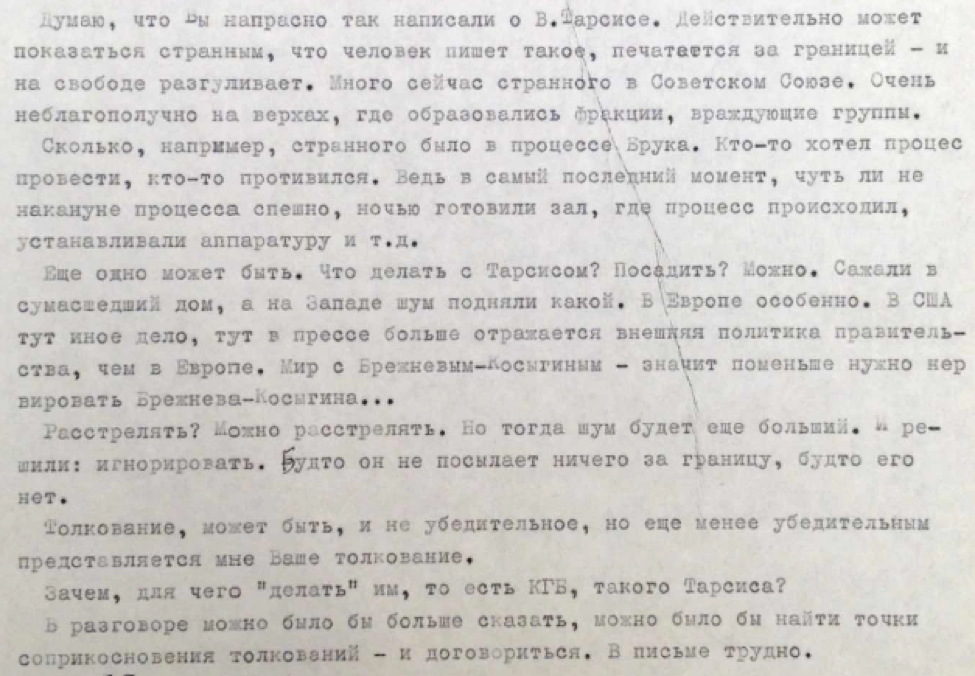Vladimir Samarin - Argus

- Vladimir Samarin
-
Authors
- Mikhail Aizenshtadt-Zheleznov
-
Addressees
- Correspondence
-
Source Type
- 8 November 1965
-
Date
- Russian
-
Language
Vladimir Samarin Papers, GEN MSS 295, Box 1, Folder 43. Beinecke Rare Book and Manuscript Library, Yale University. Translated by Anna Kulagina.
Думаю, что Вы напрасно так написали о В. Тарсисе. Действительно может показаться странным, что человек пишет такое, печатается за границей – и на свободе разгуливает. Много сейчас странного в Советском Союзе. Очень неблагополучно на верхах, где образовались фракции, враждующие группы.
Сколько, например, странного было в процессе Брука. Кто-то хотел процесс провести, кто-то противился. Ведь в самый последний момент, чуть ли не накануне процесса спешно, ночью готовили зал, где процесс происходил, устанавливали аппаратуру и т. д.
Еще одно может быть. Что делать с Тарсисом? Посадить? Можно. Сажали в сумасшедший дом, а на Западе шум подняли какой. В Европе особенно. В США тут иное дело, тут в прессе больше отражается внешняя политика правительства, чем в Европе. Мир с Брежневым-Косыгиным – значит поменьше нужно нервировать Брежнева-Косыгина...
Расстрелять? Можно расстрелять. Но тогда шум будет еще больший. И решили: игнорировать. Будто он не посылает ничего за границу, будто его нет.
Толкование, может быть, и не убедительное, но еще менее убедительным представляется мне Ваше толкование.
Зачем, для чего «делать» им, то есть КГБ, такого Тарсиса?
В разговоре можно было бы больше сказать, можно было бы найти точки соприкосновения толкований – и договориться. В письме трудно.
I think you were wrong to write about V. Tarsis like that. It could indeed seem strange that a person writes this, that it gets published abroad – and freely walks around. There are a lot of strange things happening in the Soviet Union right now. The state of affairs is very unfavorable at the top, where a lot of factions and warring groups have formed.
For instance, there were a lot of strange things about Brook’s affair. Some wanted the trial to go through, others opposed it. After all, at the very last moment, almost on the eve of the trial, the hall where the hearing took place was being hastily prepared, the equipment was being installed, etc.
One more thing. What should be done with Tarsis? Incarcerate him? Maybe. So much fuss arose in the West when they put him in a mental asylum. Especially in Europe. Here in the U.S. it is a different matter: here the government’s foreign policy is reflected more visibly in the press than in Europe. Peace with Brezhnev-Kosygin means less of a need to irritate Brezhnev-Kosygin.
To shoot him? Maybe. But then the fuss would be even greater. And so it was decided: ignore. As if he doesn’t send anything abroad, as if he doesn’t exist.
The explanation may not be convincing, but your explanation is even less convincing to me.
Why, for what does the KGB “make” such a Tarsis?
In a face-to-face conversation, more could be said, more common points for the explanation could be found, and we could agree on something. Which is hard to do in a letter.


